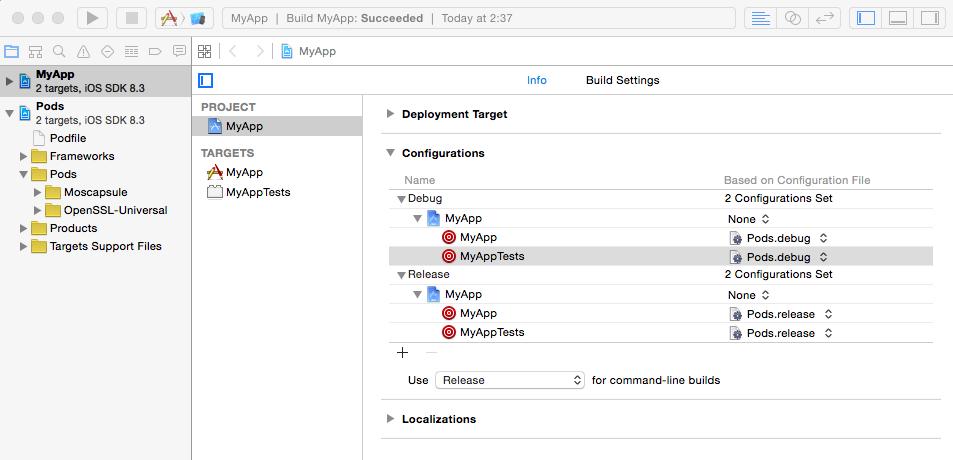MQTT Client for iOS written in Swift.
This framework is implemented as a wrapper of Mosquitto library and covers almost all mosquitto features.
It uses Mosquitto version 1.4.2.
Mosquitto is an open source message broker that implements the MQ Telemetry Transport protocol versions 3.1 and 3.1.1. MQTT provides a lightweight method of carrying out messaging using a publish/subscribe model. Mosquitto is written in C language.
CocoaPods is a Cocoa project manager. It is a easy way for to install framework, so I recommend to using it.
Specify it in your podfile;
use_frameworks!
pod 'Moscapsule', :git => 'https://github.com/flightonary/Moscapsule.git'
pod 'OpenSSL-Universal', '~> 1.0.1.l'
and then run;
$ pod install
In order to import the framework in tests, you should select configuration files.
a) Select your project and info.
b) Change configuration files from none to Pods.debug/release.
If you don't want to use CocoaPods, you can install manually.
a) Check out Moscapsule.
$ git clone https://github.com/flightonary/Moscapsule.git
b) The framework depends on OpenSSL. Before building it, you must checkout the submodule.
$ git submodule update --init
c) Create a Xcode project and Workspace if you don't have these.
d) Open workspace and drag & drop your project and Moscapsule.xcodeproj into Navigation.
e) Drag & drop Moscapsule.xcodeproj under your project tree in Navitaion.
f) Select your project and Build Phases.
g) Add Moscapsule in Target Dependencies and Link Binary With Libraries using + button.
Here is a basic sample.
import Moscapsule
// set MQTT Client Configuration
let mqttConfig = MQTTConfig(clientId: "cid", host: "test.mosquitto.org", port: 1883, keepAlive: 60)
mqttConfig.onPublishCallback = { messageId in
NSLog("published (mid=\(messageId))")
}
mqttConfig.onMessageCallback = { mqttMessage in
NSLog("MQTT Message received: payload=\(mqttMessage.payloadString)")
}
// create new MQTT Connection
let mqttClient = MQTT.newConnection(mqttConfig)
// publish and subscribe
mqttClient.publishString("message", topic: "publish/topic", qos: 2, retain: false)
mqttClient.subscribe("subscribe/topic", qos: 2)
// disconnect
mqttClient.disconnect()The framework supports TLS_PSK, Server and/or Client certification.
Here is a sample for server certificate.
import Moscapsule
// Note that you must initialize framework only once after launch application
// in case that it uses SSL/TLS functions.
moscapsule_init()
let mqttConfig = MQTTConfig(clientId: "server_cert_test", host: "test.mosquitto.org", port: 8883, keepAlive: 60)
let bundlePath = NSBundle(forClass: self.dynamicType).bundlePath.stringByAppendingPathComponent("cert.bundle")
let certFile = bundlePath.stringByAppendingPathComponent("mosquitto.org.crt")
mqttConfig.mqttServerCert = MQTTServerCert(cafile: certFile, capath: nil)
let mqttClient = MQTT.newConnection(mqttConfig)The MIT License (MIT)
tonary <[email protected]>

